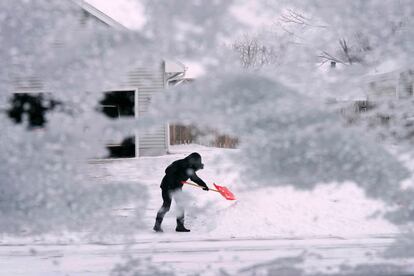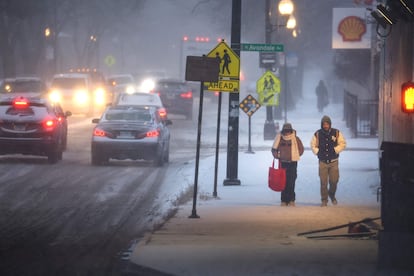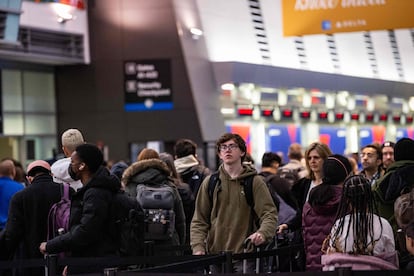Storm Elliott sweeps US and Canada, leaving millions battened down over holiday weekend
Hundreds of thousands of people have been left without power and 18 deaths have been reported as a rare bomb cyclone batters the US from the Great Lakes to the Rio Grande

Millions of people battened down in a deep freeze overnight Saturday and early Sunday morning to ride out a colossal Arctic blast that has killed at least 18 people across the United States, trapping some residents inside their houses with heaping snow drifts and knocking out power to hundreds of thousands of homes and businesses.
The frigid temperatures and gusty winds were expected to produce “dangerously cold wind chills across much of the central and eastern US this holiday weekend,” the US National Weather Service (NWS) said, adding that the conditions “will create a potentially life-threatening hazard for travelers that become stranded.”
“In some areas, being outdoors could lead to frostbite in minutes,” the NWS added.
More than 2,360 domestic and international flights were canceled Saturday, according to the tracking site FlightAware.
Forecasters said a bomb cyclone – when atmospheric pressure drops very quickly in a strong storm – had developed near the Great Lakes, stirring up blizzard conditions, including heavy winds and snow.
The storm was nearly unprecedented in its scope, stretching from the Great Lakes near Canada to the Rio Grande along the border with Mexico. About 60% of the US population faced some sort of winter weather advisory or warning and temperatures plummeted drastically below normal from east of the Rocky Mountains to the Appalachians, the NWS said.

Freezing rain coated much of the Pacific Northwest in a layer of ice, while people in the Northeast faced the threat of coastal and inland flooding.
The storm unleashed its full fury on Buffalo, with hurricane-force winds and snow causing whiteout conditions, paralyzing emergency response efforts – New York Gov. Kathy Hochul said almost every fire truck in the city was stranded – and shutting down the airport through Monday, according to officials.
Two people died in their suburban Cheektowaga, New York, homes Friday when emergency crews could not reach them in time to treat their medical conditions, he said, and another died in Buffalo.

Calling it a “kitchen sink storm,” Hochul declared a state of emergency. In parts of New York City, tidal flooding inundated roads, homes and businesses Friday morning.
The storm knocked out power in communities from Maine to Seattle, and a major electricity grid operator warned 65 million people across the eastern US could face possible rolling blackouts.
Across the six New England states, more than 273,000 customers remained without power on Saturday, with Maine the hardest hit. Some utilities said electricity may not be restored for days.
In North Carolina, 169,000 customers were without power Saturday afternoon, down from more than 485,000. Utility officials said rolling blackouts would continue for the next few days.
Storm-related deaths were reported in recent days all over the country: Four dead in an Ohio Turnpike pileup involving some 50 vehicles; four motorists killed in separate crashes in Missouri and Kansas; an Ohio utility worker electrocuted; a Vermont woman struck by a falling branch; an apparently homeless man found amid Colorado’s subzero temperatures; a woman who fell through Wisconsin river ice.
In Canada, WestJet canceled all flights Friday at Toronto Pearson International Airport, as meteorologists there warned of a potential once-in-a-decade weather event. In Mexico, migrants camped near the US border in unusually cold temperatures as they awaited a US Supreme Court decision on pandemic-era restrictions that prevent many from seeking asylum.
Sign up for our weekly newsletter to get more English-language news coverage from EL PAÍS USA Edition
Tu suscripción se está usando en otro dispositivo
¿Quieres añadir otro usuario a tu suscripción?
Si continúas leyendo en este dispositivo, no se podrá leer en el otro.
FlechaTu suscripción se está usando en otro dispositivo y solo puedes acceder a EL PAÍS desde un dispositivo a la vez.
Si quieres compartir tu cuenta, cambia tu suscripción a la modalidad Premium, así podrás añadir otro usuario. Cada uno accederá con su propia cuenta de email, lo que os permitirá personalizar vuestra experiencia en EL PAÍS.
¿Tienes una suscripción de empresa? Accede aquí para contratar más cuentas.
En el caso de no saber quién está usando tu cuenta, te recomendamos cambiar tu contraseña aquí.
Si decides continuar compartiendo tu cuenta, este mensaje se mostrará en tu dispositivo y en el de la otra persona que está usando tu cuenta de forma indefinida, afectando a tu experiencia de lectura. Puedes consultar aquí los términos y condiciones de la suscripción digital.








































